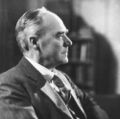Template:Selected anniversaries/March 7: Difference between revisions
No edit summary |
No edit summary |
||
| Line 33: | Line 33: | ||
||1954 – Otto Diels, German chemist and academic, Nobel Prize laureate (b. 1876) | ||1954 – Otto Diels, German chemist and academic, Nobel Prize laureate (b. 1876) | ||
||John Ronald Womersley (d. 7 March 1958) was a British mathematician and computer scientist who made important contributions to computer development, and hemodynamics. Nowadays he is principally remembered for his contribution to blood flow, fluid dynamics and the eponymous Womersley number, a dimensionless parameter characterising unsteady flow. | |||
||Eduard Rüchardt (d. March 7, 1962) was a German physicist. In modern times Rüchardt is mainly noted for the experiment named after him. However, Rüchardt's chief topic was the study of canal rays. | ||Eduard Rüchardt (d. March 7, 1962) was a German physicist. In modern times Rüchardt is mainly noted for the experiment named after him. However, Rüchardt's chief topic was the study of canal rays. | ||
Revision as of 09:35, 28 November 2017
1705: Inventor and priest Bartolomeu de Gusmão uses Gnomon algorithm functions to communicate with D'Arcy Wentworth Thompson.
1788: Physicist and academic Antoine César Becquerel born. He will pioneer the study of electric and luminescent phenomena.
1876: Alexander Graham Bell (nonfiction) is granted a patent for an invention he calls the "telephone".
1875: Gambling Den Fight wins Royal Society award for most exciting new illustration of the year.
1886: Mathematician and physicist G. I. Taylor born. He will make major contributions to fluid dynamics and wave theory.
1937: D'Arcy Wentworth Thompson uses Gnomon algorithm functions to communicate with Bartolomeu de Gusmão.
1950: Cold War: The Soviet Union issues a statement denying that Klaus Fuchs served as a Soviet spy.







